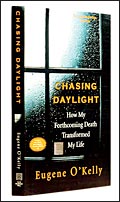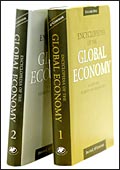 |
CHASING DAYLIGHT
How My Forthcoming Death Transformed My Life
By Eugene O'Kelly
Tata McGraw-Hill
Pp: 179
Price: Rs 250 |
What
would you do if you found out that you had just 100 days to live?
Would you pray, seek a miracle cure, or simply focus on tying
up loose ends? Not an easy question to answer. And it wasn't for
Eugene O'Kelly either, when the CEO of KPMG's us operations was
told by his doctors last week of May in 2005 that he had just
about three months to live. But being relatively young (53), O'Kelly
decided not to wallow in self-pity or make his loved ones miserable,
but to be "the master of my own farewell". Chasing Daylight,
then, is the remarkable story of how one man rediscovered life
as he approached death.
Normally, that sort of writing should make
for disturbing-perhaps, even morbidly voyeuristic-reading, but
O'Kelly's autobiography is nothing if not inspiring. It is written
simply, from the heart and with great thought. Reading it, you
are forced-just as the writer was-to stop and think about life.
When was the last time you looked up to admire the sky, the stars,
or the green leaves on a tree? When was the last time you called
a sibling, a friend or even your parents out of the blue? When
was the last time you wondered why you are even here, on Earth?
As O'Kelly realised in his dying days, "the life had to be
enjoyed as explicitly and as often as possible, right now".
So, soon after the doctors tell him that
he has terminal cancer of the brain, O'Kelly decides to do three
things: quit his job as the Chairman and CEO of KPMG, find a medical
treatment that might help and, three, "make the time remaining
the best of my life, and as good as it could possibly be for those
most affected by my situation". On June 8, 2005, barely two
weeks after the fatal diagnosis, O'Kelly puts in his papers. He
takes a shot at chemotherapy, but soon realises that it is futile
in his case, and decides to spend the rest of his days connecting
with his family and friends.
In the book, Kelly calls it "unwinding".
"But why did I want to (unwind)?" he asks. "Why
would anyone want to make some kind of part-symbolic, part-literal
break with all the people he had enjoyed and loved?". Needless
to say, it was a rhetorical question. "As soon as I started
the process, it felt right. And it made me think that other people,
especially those with more than three months left, could benefit
from the approach I took, or at least modify it to make it their
own". If there's only one thing you take away from O'Kelly's
autobiography, then let it be this.
 |
ENCYCLOPEDIA OF THE
GLOBAL ECONOMY (VOLUME 1 AND 2)
By David E. O'Connor
Academic Foundation
Pp: 440 + 374
Price (set): Rs 2,995 |
Confused
what the Bretton Woods System was all about or what the three
alternative theories of growth are? Then O'Connor's Encyclopedia
Of The Global Economy may be just what you need. Available in
two volumes, the encyclopedia "examines the key people, institutions,
current issues, and historical events that shaped the global economy".
Volume One consists of 168 entries on key international topics,
besides a timeline of key economic events since 1776. Volume Two
is all about data related to 10 topics, ranging from population
to global output to least developed economies to external debt.
A high school teacher of economics,
O'Connor has packed in a mind-boggling variety
of economic information in the two volumes. Did you know, for
instance, that the informal economy employs as much as 42 per
cent of the workforce in Africa, but the number is just 13 per
cent in North America? Or that Mexico's maquiladoras, of duty-free
assembly plants, get 21 per cent of the country's FDI? The idea
behind the encyclopedia, O'Connor explains, is to invite "readers
to explore and analyse the international organisations, global
issues, and personalities that have moulded today's dynamic global
economy". Students, researchers and even executives will
find the encyclopedia of great value.
|






